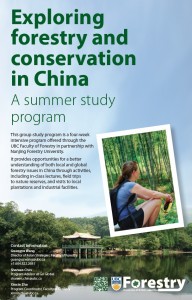Why Do We Still Perceive All Religions Through a Christian Lens? An Alternative Approach to Understanding Religion
Religions tend to be understood on the Christian model. Thus the religions of large parts of the world—examples being Chinese Religion and Native American religions—are not accorded recognition by the Canadian government. This talk will lay out the parameters of a hitherto unrecognized religious construct that begins with the horticultural revolution and continues today in virtually all religious traditions outside of the far north.
Exploring Forestry and Conservation in China – Go Global Group Study Program Display
International travel can be a rewarding part of your learning experience! The Go Global Forestry Program “Exploring forestry and conservation in China” would like to invite you stop by their booth to enjoy the display boards, photo slideshow, video display, and conversations with the past participants.
Lessons from Mongolian State Evolution: The Anthropocentric Theory of Human Security
This talk will draw from some of Dr. Bedeski’s recent publications, examining the genesis of the Mongolian state in 1206, its expansion and hegemony over Asiatica, and its twentieth-century transformation into a Modern Sovereign Nation-State. The second part of the talk will outline a framework of analysis designated as ‘The Anthropocentric Theory of Human Security.’
Student Engagement & Assessment in Large Classes
“Flipping your classroom – Why, how and what can happen”
Dr. Bates will present a practice-based case study of curriculum redesign implemented in a large-enrollment introductory Physics course taught at the University of Edinburgh. The course was inverted, or “flipped”, in the sense that content and material was delivered to students outside class lectures using various strategies including technology, so that lecture time could be utilized as problem-solving sessions. Dr. Bates will present details of student engagement, comment on student perceptions of the instructional format, and present data that presents evidence for high quality student learning.
Title 2: TBA


